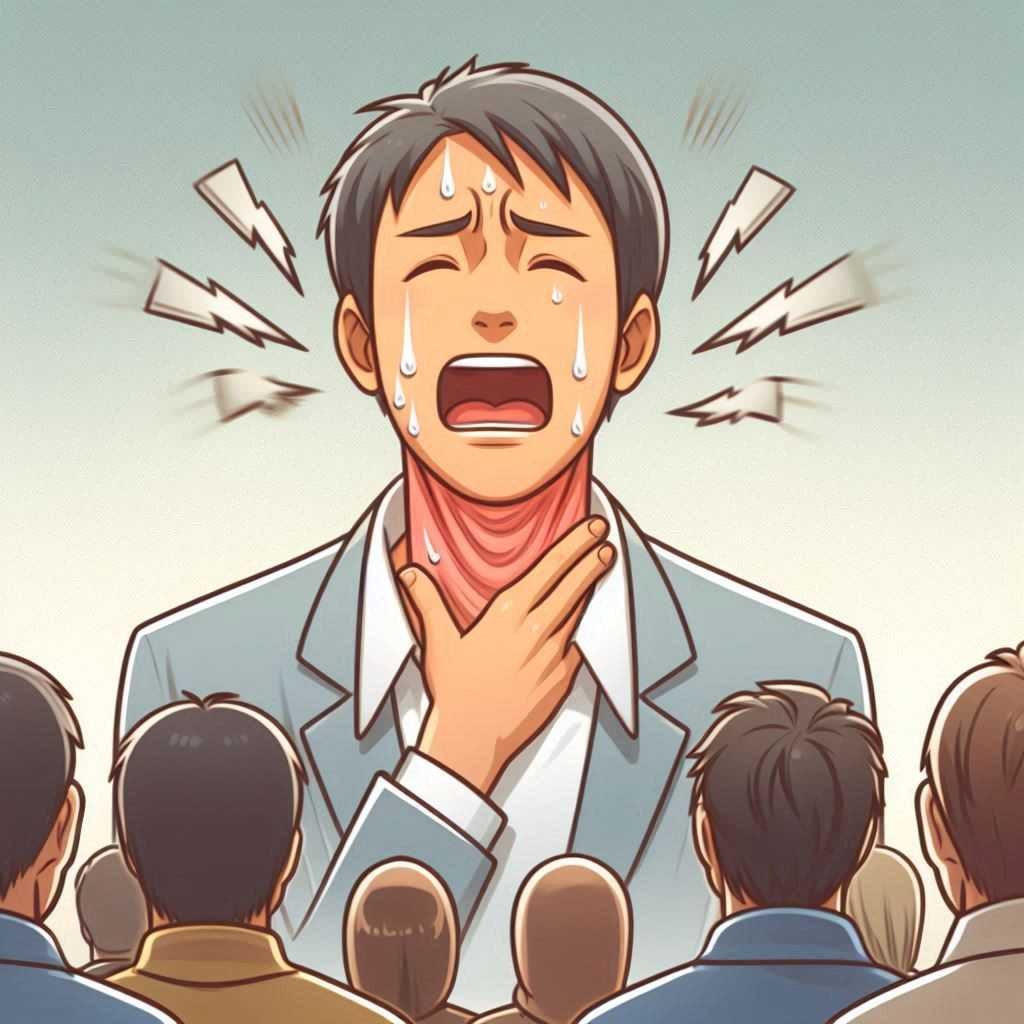Relation Between Stress, Anxiety, and Your Throat

Nowadays, stress and anxiety have become a common problem, and dealing with it has also become more complicated. The reason behind this is that not getting much information about it. Literally, people don’t know how to deal with it.
Don’t worry, today we will discuss one of the problems related to stress and anxiety, which is that can stress and anxiety can cause a sore throat?
which means that stress and anxiety cause physical symptoms like (dry mouth, and changes in the body’s immune response, which may lead to a sore throat or discomfort in the throat area.)
Table of Contents
The Stress And Anxiety (Throat Connection)

Approximately 77% of people experience physical symptoms caused by stress, with throat discomfort. It’s not a small percentage; that percentage shows that almost every person is being trapped by it.
Dr. Sarah Johnson, a psychologist specialized in stress-related disorders, explains, “The throat is an area of the body particularly sensitive to emotional states. When we’re stressed or anxious, it’s not uncommon for this to manifest as physical discomfort in the throat region.”
How Stress And Anxiety Affect Your Throat

To understand why stress and anxiety can cause throat issues, we need to understand the body’s stress response mechanism.
When we’re stressed or anxious, our body goes into “fight or flight” mode, triggering a cascade of physiological changes.
Dr. Michael Lee, an otolaryngologist (ENT specialist) at Mayo Clinic, elaborates: “During stress, the body releases stress hormones like cortisol and adrenaline. These hormones can cause muscle tension, including in the throat area. Additionally, stress can lead to changes in breathing patterns and increased acid reflux, both of which can affect the throat.”
Eckhart Tolle, celebrated author and spiritual teacher, once said, “Stress is caused by being ‘here’ but wanting to be ‘there’.”
This quote reminds us that stress often from a disconnect between our current reality and our desires, a tension that can manifest physically in areas like our throat.
Common Throat Symptoms Caused by Stress and Anxiety
Stress and anxiety can cause some throat-related symptoms. Here are some of the most common:

- Sore Throat: A continuous sore throat without cold or flu symptoms can be due to stress and anxiety.
Case Study: Jane, a 32-year-old marketing executive, experienced recurring sore throats during high-stress periods at work. After ruling out infections, her doctor suggested stress management techniques, which significantly reduced her symptoms.
- Throat Tightness: Many people describe a feeling of tightness or a “lump in the throat” when they are anxious.
Real-life Example: Tom, a college student, noticed his throat felt tight before important exams. Practicing deep breathing and meditation exercises helped alleviate this symptom.
- Difficulty Swallowing (Dysphagia): Stress can cause the throat muscles to constrict, making swallowing challenging.
Expert Insight: Dr. Lisa Chen, a speech-language pathologist, notes, “Stress-induced dysphagia is more common than many realize. It’s often temporary but can be distressing for those experiencing it.”
- Excessive Throat Clearing: Anxiety can increase mucus production and the sensation of needing to clear the throat.
- Dry or Scratchy Throat: Stress can affect saliva production, which sometimes makes the throat dry, scratchy feeling in the throat.
These all common symptoms are caused by stress and anxiety. But remember that being involved in these problems can cause really harmful effects on your throat and also it can damage your throat
The Relation Of Throat Issues With Stress And Anxiety
Stress and Anxiety can be affective in some ways, many of these are directly related to throat sensations. Getting of Understanding these connections can help in managing both anxiety and throat discomfort:
- Hyperawareness: Stress and anxiety often cause heightened body awareness, making normal throat sensations feel more intense or uncomfortable.
- Shallow Breathing: Anxious individuals may breathe from their chest rather than their diaphragm, leading to throat tension.
- Muscle Tension: General muscle tension from anxiety can affect the throat and neck area.
- Acid Reflux: Anxiety can increase stomach acid production, potentially leading to reflux and throat irritation.
- Dry Mouth: Anxiety can decrease saliva production, causing a dry, uncomfortable feeling in the throat.
Dr. Emily Sato, a clinical psychologist specializing in anxiety disorders, explains, “Many of my patients are surprised to learn how closely their anxiety symptoms are tied to their throat discomfort. Addressing the anxiety often leads to significant improvement in throat symptoms.”
Panic Attacks and Throat Sensations
Panic attacks, intense episodes of anxiety, can have a big impact on throat sensations. During a panic attack, individuals may experience:
- A choking sensation or feeling of throat constriction
- Difficulty swallowing
- A sensation of not being able to breathe properly
These symptoms, while distressing, are typically not dangerous. Dr. Mark Thompson, an emergency medicine physician, reassures,
“The throat sensations during a panic attack, while very real and frightening to the individual, rarely pose any actual risk of choking or suffocation. Understanding this can be a crucial step in managing panic attacks.”
Social Anxiety and Throat Symptoms
Social anxiety disorder, characterized by intense fear of social situations, can also manifest in throat-related symptoms:

- Voice Changes: Individuals with social anxiety may experience a shaky or weak voice in social situations.
- Dry Throat: The stress of social interactions can lead to a dry or tight feeling in the throat.
- Difficulty Speaking: Some people with social anxiety report feeling like words get “stuck” in their throat.
Dr. Rachel Green, a clinical psychologist specializing in social anxiety, notes, “For many of my patients with social anxiety, throat discomfort is one of their primary physical symptoms. Addressing the underlying anxiety often leads to significant improvement in these throat-related issues.”
Differentiating Anxiety-Related Sore Throat from Other Causes
It’s crucial to distinguish between a sore throat caused by anxiety and one caused by other factors like infections or allergies. Here are some key differences:
- Timing: Anxiety-related sore throats often coincide with stressful events or situations.
- Other Symptoms: Unlike infections, anxiety-related sore throats usually don’t come with fever, runny nose, or body aches.
- Duration: While infection-related sore throats typically improve within a week, anxiety-related throat discomfort may persist as long as the stress or anxiety continues.
- Response to Treatment: Anxiety-related sore throats often improve with stress-reduction techniques, while infection-related sore throats respond to medical treatments.
Dr. Sarah Lee, an integrative medicine specialist, advises, “If you’re unsure about the cause of your sore throat, especially if it persists for more than two weeks, it’s always best to consult with a healthcare professional. They can help determine the underlying cause and recommend appropriate treatment.”
Managing Stress-Related Throat Issues: Effective Strategies
Discussing some stress-related throat issues involves a two-pronged approach: managing the underlying stress and providing relief for throat symptoms. Here are some effective strategies:

Short-Term Relief Methods:
- Using a humidifier to moisten the air
- Sipping warm water or herbal tea
- Gentle throat stretches and exercises
Long-Term Stress Management Strategies:
- Mindfulness and Meditation: Regular practice can significantly reduce stress levels.
- Regular Exercise: Physical activity is a powerful stress-buster.
- Adequate Sleep: Prioritize getting 7-9 hours of quality sleep nightly.
- Balanced Diet: A nutritious diet supports overall health and stress resilience.
Dr. Emily Wong, a stress management expert, emphasizes, “Consistency is key in stress management. Small, daily efforts in reducing stress can lead to significant improvements in both mental and physical health, including alleviating throat symptoms.”
Online Therapy Options
In today’s digital age, online therapy has become an increasingly popular and effective option for managing stress and anxiety. Platforms like BetterHelp, Talkspace, and ReGain offer convenient access to licensed therapists from the comfort of your home.
Dr. Jason Kim, a psychologist who has embraced online therapy, shares, “Online therapy can be just as effective as in-person sessions for many individuals dealing with stress and anxiety. It offers flexibility and accessibility, which can be particularly beneficial for those with busy schedules or mobility issues.”
Change Your Lifestyle For Stress And Anxiety (Throat Issues)
Changing lifestyles can reduce the occurrence of stress and anxiety-related throat problems. Here below are the following tips:
- Practice time management to reduce work-related stress and anxiety
- Set boundaries in personal and professional life
- Engage in hobbies and activities you enjoy (You can also read some books)
- Supportive relationships and social connections
- Consider stress and anxiety-reducing supplements like ashwagandha or rhodiola (consult with a healthcare provider first)
Success Story: Mark, a 45-year-old teacher, suffered from chronic throat tightness due to work-related stress. By implementing regular yoga practice, setting clear work-life boundaries, and practicing mindfulness, he saw a significant reduction in his symptoms within three months.
The Mental Health Connection Between Stress And Anxiety
Managing physical symptoms is important, addressing underlying anxiety and stress is crucial for long-term relief.
Dr. Rachel Green, a clinical psychologist, notes, “Chronic stress and anxiety can create a vicious cycle, where physical symptoms increase anxiety, which in turn exacerbates the physical symptoms. Breaking this cycle often requires professional help.”
If you’re struggling with persistent stress or anxiety, Then:
- Talking to a therapist or counselor
- Joining support groups
- Exploring cognitive-behavioral therapy (CBT) techniques
- Consulting with a psychiatrist about medication options if necessary
Remember, seeking help is a sign of strength, not weakness.
Conclusion
Stress and anxiety-related throat issues can be challenging, but they are manageable with the right approach. By understanding the connection between your mental state and physical symptoms, you can take proactive steps towards healing.
As the renowned psychiatrist
Dr. Viktor Frankl once said, “When we are no longer able to change a situation, we are challenged to change ourselves.”
This powerful quote reminds us that while we may not always control our circumstances, we have the power to change our response to stress and anxiety.
Remember, you’re not alone in this journey. With patience, persistence, and the right support, you can overcome stress-related throat issues and move towards a healthier, more balanced life.
FAQs
- Can stress cause a sore throat?
Yes, stress can cause a sore throat. The body’s stress response can lead to muscle tension in the throat area and affect the immune system, potentially resulting in a sore throat.
- How can I tell if my sore throat is caused by stress or an illness?
A stress-related sore throat typically doesn’t come with other cold or flu symptoms like fever or runny nose. It often coincides with stressful periods and may improve with stress reduction techniques.
- Can anxiety cause a feeling of tightness in the throat?
Yes, anxiety can cause a sensation of tightness or a “lump” in the throat, known as globus pharyngeus.
- Can stress and anxiety cause tonsillitis?
While stress and anxiety don’t directly cause tonsillitis, they can weaken the immune system, making you more susceptible to infections like tonsillitis.
- How long can a stress-induced sore throat last?
The duration can vary, but if stress levels remain high, the sore throat may persist. Implementing stress reduction techniques often leads to improvement.
- Are there any specific foods that can help with a stress-related sore throat?
Soothing foods like warm soups, herbal teas with honey, and cool foods like yogurt or ice cream may provide temporary relief.
- Can stress cause difficulty swallowing?
Yes, stress can cause the throat muscles to tense up, potentially leading to difficulty swallowing, known as dysphagia.
- Is it possible to get a sore throat from crying due to stress?
Yes, excessive crying can irritate the throat and, combined with the stress that caused the crying, may result in a sore throat.
- Can social anxiety cause throat symptoms?
Yes, social anxiety can lead to throat symptoms such as a dry throat, difficulty speaking, or a sensation of words getting “stuck” in the throat.
- How effective is online therapy for managing stress-related throat issues?
Online therapy can be very effective for managing stress and anxiety, which in turn can help alleviate related throat issues. It offers convenience and accessibility, making it easier for many people to get the help they need.
Remember, while these FAQs provide general information, it’s always best to consult with a healthcare professional for persistent or severe symptoms.